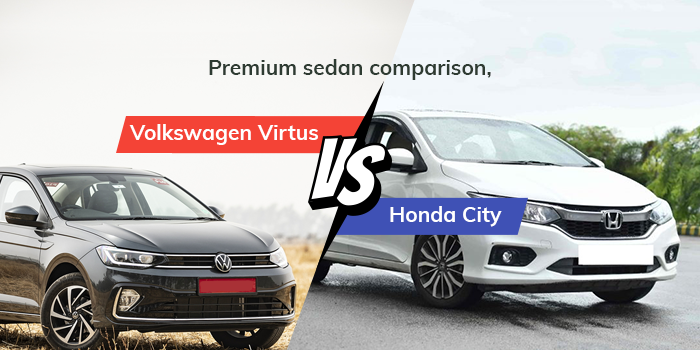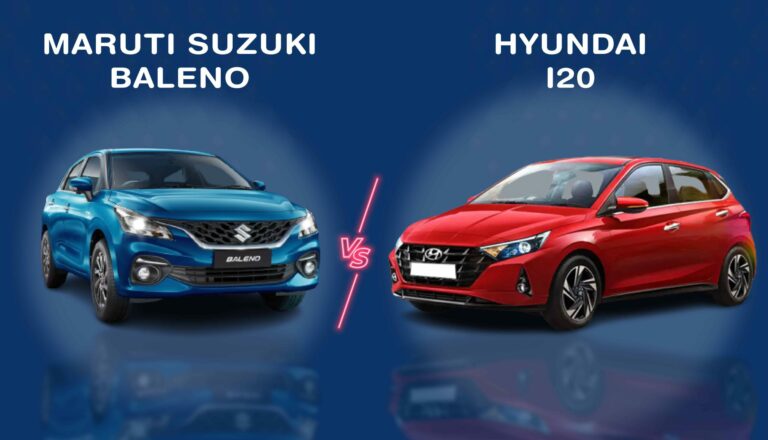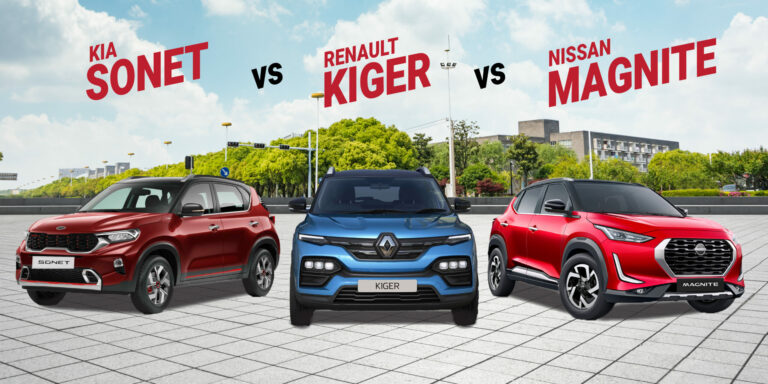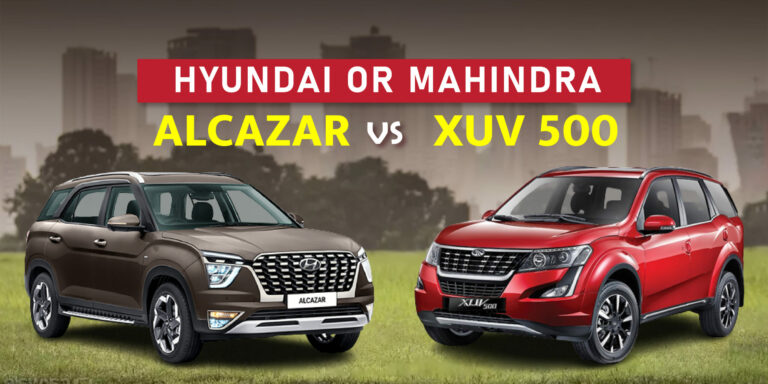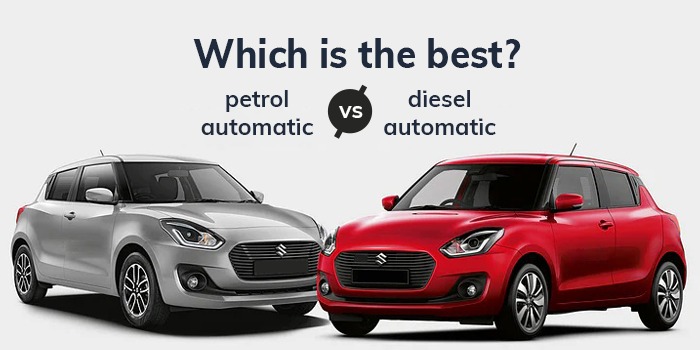
Deciding on a new car can be tough decision given the large number of models available in the Indian auto market. Once we narrow down on the car, we have to decide on a petrol or diesel engine. Next, we have the option between automatic and manual transmission. The choice between petrol automatic vs diesel automatic is not an easy one.
Which engine and transmission option is better? Diesel automatic vs petrol automatic. Petrol engines provide quick response and are smooth to drive. Diesel engines have high torque and good fuel efficiency but are a bit rough and noisy. In the world of automatic transmissions , which is better petrol or diesel power?
This article looks at the finer differences between the two and could help you make the right decision when it comes time to buy a new car.
Choosing the right fuel type for your automatic car
There has been talk of switching to electric cars in the future, but the majority of vehicles on the road today are still use internal combustion engines powered by petrol or diesel. Electric cars may not be the best choice today for several reasons including limited range of EVs, lack of a wide network of charging infrastructure and the high initial cost for electric vehicles.
Car buyers are more inclined towards the choice between diesel vs petrol automatic because internal combustion cars are convenient to drive, although, they do produce a lot of pollution.
When it comes to the choice between manual and automatic transmission, drivers prefer automatics because it provides hassle-free driving, freeing up the constant effort of using a clutch and changing gears. In city traffic and even on the highways, an automatic car is very convenient and allows you to enjoy the drive without any stress.
Petrol vs diesel cars -Which is better?
Let’s detail the differences between petrol and diesel engine before we compare the type of transmission for each engine.
Cost – Petrol cars are more affordable than diesel cars because of their lighter construction and simple components used. Diesel engines have to be built more robustly which makes their initial cost more expensive.
Service – Petrol cars require less maintenance and service costs are low. Petrol fuel burns more cleanly than diesel and leaves less carbon deposits behind. Diesel engines need to be serviced regularly and the cost of maintenance is higher.
Fuel economy – Petrol engines have good acceleration and top speed but they suffer from poor fuel economy. Diesel engine have a high amount of torque that is good for hauling loads, but acceleration and top speed is lower than petrol cars. Also diesel fuel is less costly than petrol.
NVH (noise, vibration, harshness) – Petrol engines run smoothly. The cabin does not receive too much noise and the ride is generally quiet. Diesel engine are quite harsh and they tend to get noisy when run. The cabin receives harsh vibrations and sound from the engine.
Performance – Acceleration on petrol cars is quick and the power delivery is linear until it reaches peak bhp and torque. In diesel cars, the torque is very strong and can pull effortlessly uphill or when carrying a load. Overall power output is less when compared to a petrol engine.
Pollution – Petrol burns cleaner than diesel and there is less carbon content in the exhaust fumes. Petrol is a lighter hydrocarbon that undergoes a higher refinement process from crude oil. Diesel is heavy and oily. It burns with a lot of pollution and carbon deposits in its fumes.
Engine life – petrol engines wear out quicker than diesel engines. Diesel has a natural lubricating property which reduces wear and tear on engine components. Hence, diesel powered engines last longer than their petrol counterparts.
Price of fuel – Petrol is a highly refined fuel therefore it costs more than diesel. However, the price of diesel in most countries including India is slowly caching up to the price of petrol.
Resale value – In India, diesel cars are preferred which makes their resale value higher than petrol cars.
You might be wondering if a manual or automatic transmission makes a difference to the fuel type in the above-mentioned comparison. The truth is that the differences between petrol and diesel engines holds good no matter which type of transmission is used.
So, when making a choice between diesel automatic vs petrol automatic, it is good to know the basic differences in the type of fuel used in each engine.
Petrol automatic vs diesel automatic – The basic differences
Diesel automatics are well suited in high end cars such as premium hatchbacks and luxury sedans, even on compact and large SUVs. Since their initial cost is higher, they make more sense in the long run.
Petrol automatics are better off with small capacity, entry level hatchbacks. An automatic gearbox on a 1.0 litre petrol engine works very smoothly and is perfect for driving around the city.
Now let’s detail the differences between petrol automatic vs diesel automatic.
How rare are they? – Petrol automatics are more common and can be found in budget friendly, entry level hatchbacks. Automatic transmissions are well suited to petrol engines because they make the driving experience smooth and refined. Diesel automatics are not that common because drivers prefer to have more control of the engine rpms with a diesel engine. Diesel automatic cars are reserved for premium hatchbacks, sedans and SUVs which are in the higher price bracket.
Initial cost – Diesel automatics are costlier to buy and maintain when compared to petrol automatics. Even with a manual transmission, petrol cars are cheaper to buy which makes them more popular.
Fuel mileage – When it comes to fuel economy, diesel cars are more efficient than petrol engines and this is the case with diesel and petrol automatics too. However, the difference in mileage for diesel automatics vs petrol automatics is less pronounced which is slightly discouraging for buyers because it defeats one the main advantage of choosing a diesel car.
Driving – Car buyers prefer to choose a diesel car with manual transmission because it gives more control over engine performance. Diesel engines have loads of torque in the lower end and with a manual transmission, the driver is able to make full use of this extra pulling power by staying on the same gear. With a diesel automatic, gear shifts are according to various factors and may not make efficient use of the torque.
Petrol engines work well with automatic transmission because they have linear power delivery that allows the automatic gearbox to work efficiently.
Turbocharging – Diesel cars often have a turbocharger installed to help with power delivery. You can find a turbo powered diesel engine from a small hatchback to a large SUV. Petrol engine only have turbos when performance is required but they work extremely well in naturally aspirated power units. A turbocharged diesel that has an automatic transmission will have to take into account the turbo lag created in the lower rpm range and shift gears when required. A turbocharged petrol with an automatic gearbox will not have these same concerns.
Also Checkout Explaining the Cooling System in Automobiles – Which One is Best?
What are some petrol automatic vs diesel automatic cars in India?
There are a wide selection of diesel vs petrol automatics available for the discerning car buyer in India.
The cheapest petrol automatic car you can buy in India is the Datsun Redi-Go priced at Rs.4.96 (average ex-showroom price). It is available with an AMT gearbox (Automated Manual Transmission) that offers good performance from its 1.0 litre engine with a decent fuel economy figure of 22 kmpl.
The newly launched Maruti Suzuki Alto K10 (presented on August 18th, 2022) is also a good option for a petrol automatic. It also has an AMT gearbox mated to a 1.0 litre engine. The Alto K10 is priced at Rs.5.84 lakh (average ex-showroom price).
The least expensive diesel automatic available in the Indian market is the Hyundai Grand i10 Nios priced at Rs.8.46 lakh (average ex-showroom price). It has an AMT gearbox and is positioned in the premium hatchback segment taking on cars such as the Maruti Suzuki Swift.
Another great option for a diesel automatic is the Hyundai Aura priced at Rs.9.51 lakh (average ex-showroom price). It is powered by a 1.2 litre CRDi diesel engine producing 74 bhp and 190 Nm.
Automatic transmissions like the CVT, torque converter and DCT are reserved for higher priced cars as they are more sophisticated units that are used on more powerful engines.
Also read The Difference Between A 2-stroke And 4-stroke Engines
Conclusion
Drivers often state that when choosing a diesel car, their choice of transmission is more inclined towards manual because it gives them more control of the car and a better driving experience. An automatic transmission takes away some of the enjoyment of driving, and the ride becomes a little boring and uninvolved.
If you must have an automatic car, then you are better off with a petrol engine which works well and provides a pleasant driving experience.
Some petrol automatics cars that you can buy in India include the Datsun Redi-Go, Maruti Suzuki Alto K10, Maruti Suzuki S-Presso, Renault Kwid, Hyundai Santro, Maruti Suzuki Celerio and Tata Tiago. All these cars are entry level hatchbacks that have an affordable price tag with reliable engines and transmissions.
Diesel automatics in the Indian auto market include the Hyundai Grand i10 Nios, Hyundai Aura, Tata Nexon, Mahindra XUV 300 and Honda Amaze. These cars are priced slightly higher than petrol automatics but provide a whole new driving adventure.
If you found this article on Petrol Automatic vs Diesel Automatic interesting, you may also want to read about Conventional Vs Synthetic Engine Oil or Choosing the Best Car and Bike Engine Oil in India and visit carorbis blog for more blogs like this.
Frequently Asked Questions
Q1. Are petrol automatic cars more powerful than diesel automatic cars?
Ans. Given the same engine capacity, petrol automatic cars are more powerful than diesel automatic cars. Petrol engines burn fuel and extract more power in terms of bhp. However, diesel automatics have a higher peak torque, especially at low rpms giving them increased pulling power and load hauling capacity.
Q2. Are diesel automatic cars less reliable than their petrol counterparts?
Ans. Yes. Petrol automatic cars are more reliable than diesel automatics because the engine and transmission components are simple and can also be repaired easily. Diesel engine and transmission components are more likely to break down and consist of complex mechanical components that require expensive repairs.
However, it must be noted that diesel fuel is like a heavy oil and has certain lubricating properties. This helps the engine work better and in certain cases may provide a long life for the engine. This property of diesel fuel can help reduce wear and tear of engine components.
Q3. What are the different kinds of automatic transmissions for car?
Ans. Whether the engine is fuelled by petrol or diesel, the automatic transmission systems are common for both. The different types of gearboxes are AMT, CVT, Torque Converter, DCT and iMT.
AMT is Automated Manual Transmission which has an automatic clutch and automatic shifting of gears. iMT (Intelligent Manual Transmission) is similar to AMT but iMTs do not have a clutch pedal. Both AMTs and iMTs are based on a manual gearbox but have electronics and mechanical actuators to operate the clutch and shift gears.
CVT is Continuously Variable Transmission that has infinite gear ratios by making use of two pulleys connected by a belt. Throttle inputs are linear and the gear shifting is smooth.
Torque converters make use of planetary gear systems and are considered the original automatic transmission. They are expensive but the gear shifts and rpm variations are very refined.
DCT stands for Dual Clutch Transmission that offers a sporty and responsive gearbox. Gear shifts are quick and smooth and the transmission can quickly downshift for immediate acceleration.
Q4. Which is better for city driving, petrol automatic vs diesel automatic?
Ans. For city driving where constant shifting of gears and varying speed is required, the petrol automatic is a better choice because gear shifts will be smoother. Diesel automatics can only shift at certain rpms, so constant acceleration and braking may cause jerky responses from the transmission. Diesel automatics will also be less fuel efficient in the city which defeats one of its main advantages over petrol automatics.


